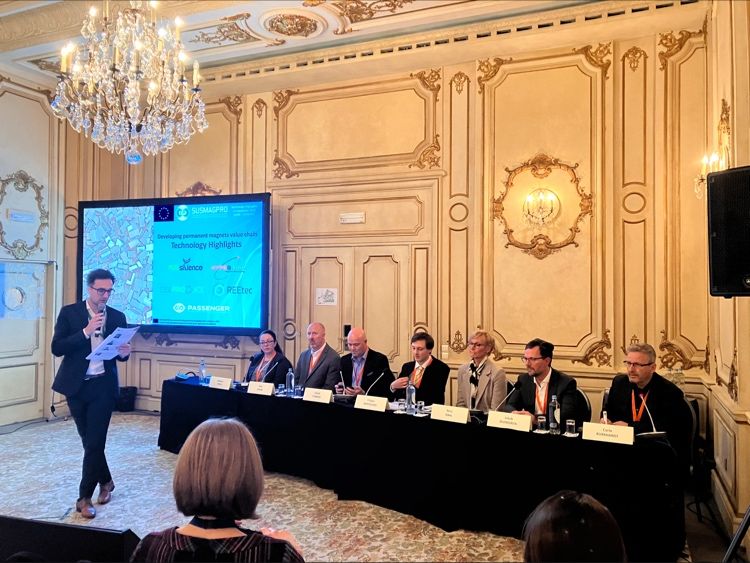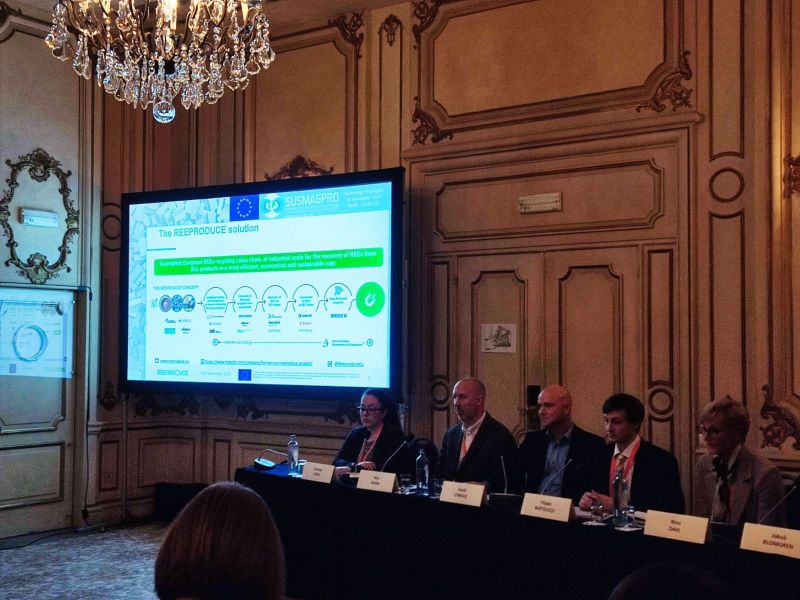29 Nov 2023
The REEPRODUCE project at the Raw Materials Week 2023!

The REEPRODUCE project participated in the SUSMAGPRO final event during the Raw Material Week organised by the European Commission in Brussels from November 13 to 17, 2023.
The Raw Materials week serves as a nexus for a diverse array of stakeholders converging to address challenges within the raw material industry. The participants engaged in different discussion, delving into potential solutions from multifaceted viewpoints, encompassing policy, legislation, academia, and industry perspectives. Moreover, the event offered a comprehensive insight into the ongoing activities within the raw material sector. In this framework, the discussions were steered by the Critical Raw Material Act (CRMA), a cornerstone of Europe’s economic stability and resilience. In March 2023, the CRMA outlined crucial benchmarks for strategic raw materials, advocating that the EU should aim to extract at least 10%, recycle 15%, and process 40% of its annual needs, ensuring that no more than 65% of the EU’s annual consumption originates from a single third country. In the conclusive version of the shared document, negotiators elevated the recycling target by an additional 25%.
In this context, the SUSMAGPRO project together with European Raw Materials Alliance (ERMA) and the Global Rare Earth Industry Association (REIA), organised a session titled “Developing permanent magnets value chain” . The SUSMAGPRO project coordinator, Prof. Carlo Burkhardt, moderated the session, encompassing all aspects of a circular value chin. This session brought together various projects like REEPRODUCE and REEsillience focusing on the automated extraction of end-of-life magnets, as well as the demonstration of recycled magnets in applications in SUSMAGPRO to upscaling with the spin-offs REEtec and HyProMag, and finally the substitution of critical raw materials in the project PASSENGER. Discussions delved into securing and diversifying the supply of rare earth magnets value chain, strategies for securing and diversifying the supply of rare earths, and the establishment of a circular rare earth ecosystem in Europe.
During the session titled “REEsilience and REEPRODUCE – Dealing with scrap: Automated sorting and separating line for magnets from end-of-life products”, Dr. Nina Dahl, Researcher Director at SINTEF Industry (Coordinator of the REEPRODUCE project), presented the innovative solution of the project as well as the work done so far. The session highlighted diverse recycling approaches and technological advancements considering their sustainability, economic viability and environmental impacts. Esteemed scientists, entrepreneurs and industry experts within the rare earth and magnet supply chain analysed the existing dynamics of the industry aligning them with the EU policies, identifying bottlenecks spanning from mining to magnet production, tackling resource dependency challenges, and highlighting the importance of fostering international collaboration. Speakers unanimously advocated for “Europe has to secure a resilient and self-sufficient supply chain”, stressing the importance of converting developed circular economy technologies into actionable practices.
Concluding, to strengthen the European economy is crucial to emphasised the importance of short-loop recycling, using recycled materials in various products, and making permanent magnets more recyclable. These initiatives will be further advances by establishing product design guidelines for easier recycling and innovating materials substitution strategies. These approaches will guide Europe towards a more sustainable and efficient future.
